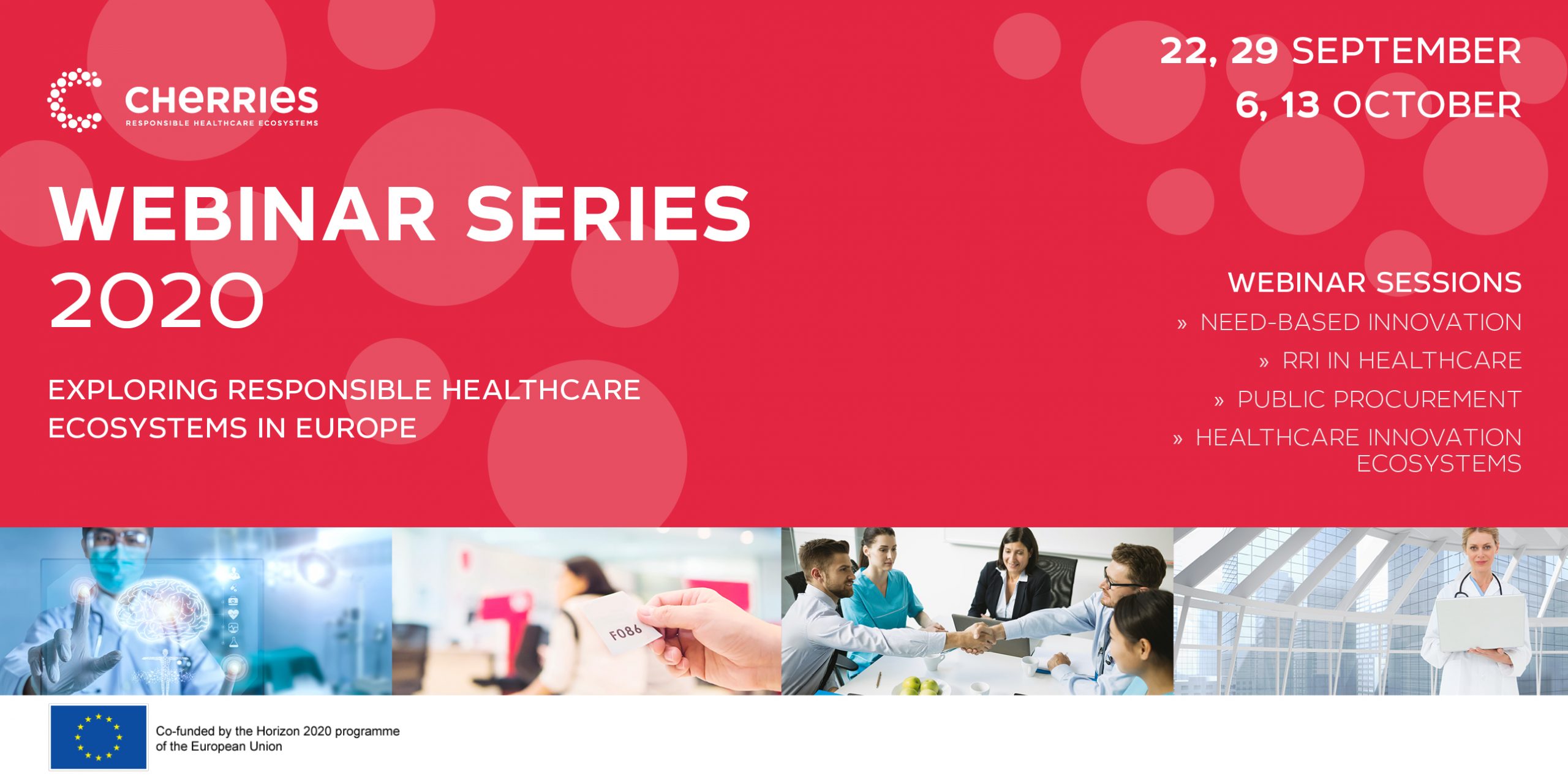Last September and October 2020, we organised a series of four webinars aimed to discuss different aspects of responsible healthcare innovation covering dimensions that are central for the CHERRIES project. In a format designed by EBN, theoretical and practical perspectives were combined in order to provide well-grounded yet practical information to our diverse set of stakeholders and to discuss how to address these sectoral facets in the context of a complex system like healthcare one.
We asked CHERRIES coordinator, Stefan Philipp (ZSI), to comment the whole series highlighting main outcomes and key reflections that will be further explored during CHERRIES territorial experiments. Below his highlights and take home messages.
The health sector is facing several challenges that are pushing for significant changes: aging population, increasing prevalence of chronic diseases, comorbidities, access to healthcare services in COVID-19 era, just to mention a few. At the same time, healthcare provision systems are facing constant pressure to reduce costs while improving quality. Thus, healthcare decision-makers increasingly recognise the potential of innovation to help respond to the challenges they face and to support high quality, safe, and effective care.
Therefore, the first webinar with the speakers Wouter Boon (University of Utrecht) and Myriam Martin (ticbiomed) focused on role of need in open and user-led innovation approaches in healthcare. Questions were revolving around need identification between actors with different perspectives and the implementation of innovation cultures in and between organisations.
In the second webinar, Rosina Malagrida (Head of the Living Lab for Health at IrsiCaixa) and Barbara Kieslinger (ZSI) explored how RRI and maker approaches contribute to manage the complexity that innovation in the healthcare are facing. The main points stressed were that RRI and co-design help to create real impact with and for society, moving from an organisational perspective to a community one.
During the third webinar, with the speakers John Rigby (University of Manchester; Bibliometica) and Samuli Kauppinen (Oulu University Hospital), questions of demand-side policy and public procurement of innovation have been discussed with insights from the Manchester area and the development of a new procurement programme at the Oulu University Hospital.
The fourth and final webinar, focused on regional innovation policy and eco-system approaches in the context of European cohesion and healthcare policy with inputs from Gaston Heimeriks (Leiden and Utrecht University) and Anett Ruszanov (ERRIN). Questions of governance and the importance of networks, both within and beyond the regional boarders, have been discussed in the context of the regional potential to specialise in specific sectoral niches and technologies.
Reflecting the eight inputs and subsequent discussions, two themes emerge as shared experience.
First, the complexity of the sector that makes it impossible for a single actor or organisation to have a comprehensive overview of all processes running in parallel within a healthcare (innovation) system – John Rigby even described the sector as a jungle rather than a system. This complexity is necessarily leading to distributed governance structures that pose the risk of silos and poor alignment between system elements.
In direct connection to that, the second theme has been the importance of communication. The distributed knowledge about the sector’s needs implies that agency – understood as the ability to act within the system – must be understood as a collective effort. The constant enhancement and adaption needed to support high quality, safe, and effective care thus is depending of communication processes. These communication processes include patient – general practitioner, general practitioner – specialist, specialist – hospital management, hospital management – innovative SME relationships and many more communication processes that contribute to effectively translating needs to innovative solutions that are well aligned with organisational and technological requirements as well as with societal expectations.
In the CHERRIES project, we aim to support regional ecosystems with these alignments and will work to support communication processes within and between regions. We recently published the call for needs aiming at regional eco-systems to reflect, identify and communicate issues within or connected to the healthcare system that are affecting either the healthcare service delivery quality, or creating avoidable costs within the healthcare system, or both things at once. Subsequently, we will develop solutions aiming to solve selected needs in co-creation processes – thereby to work towards opening of communication processes and alignment of innovative solutions with specific requirements in a complex system.
